AI-Powered Search Engine: Find The Right Answers Faster
Introduction
Nowadays, it’s extremely important to find information quickly and efficiently.
Artificial Intelligence (AI) transforms web searching, making it faster, more accurate, and more personalized than traditional methods.
Traditional search engines often fail to provide quick and relevant results since they mostly rely on matching keywords and static algorithms.
At the same time, AI-powered search engines use advanced AI technology to fully understand user queries and provide faster, more accurate, and relevant results.
This article reviews how artificial intelligence is changing web searches, emphasizing how it has improved our ability to find exact information quickly.
TL;DR
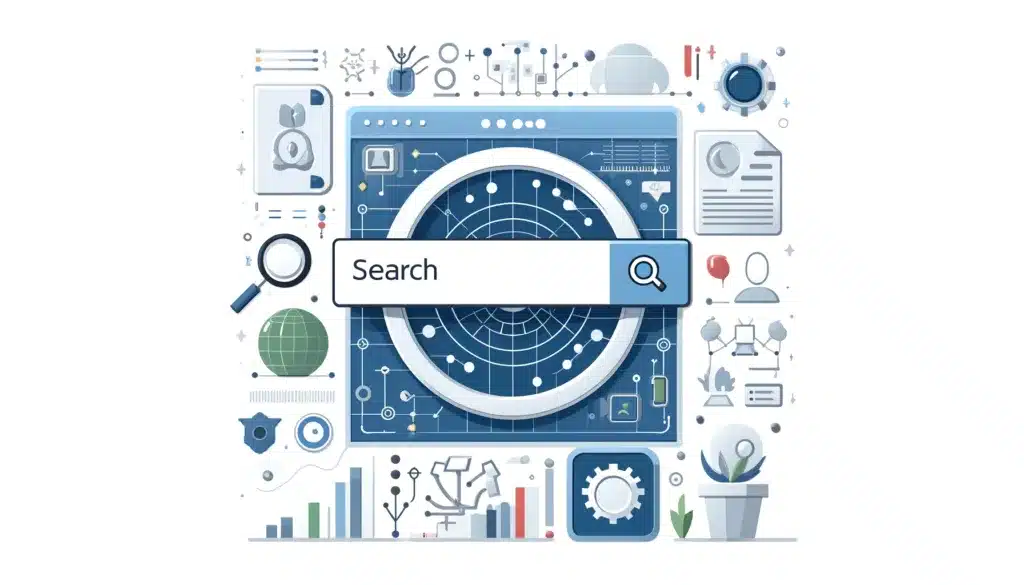
In case you’re in a hurry, here are the key takeaways:
- AI search engines use deep learning models and natural language processing to understand the intent behind your queries, delivering more accurate and relevant search results.
- New AI search tools offer a more intuitive user experience by learning from previous searches to provide personalized recommendations and predict user needs before a query is made.
- AI web search tools include Perplexity.ai, which offers conversational answers; You.com, which prioritizes privacy and personalization; Elicit.org, which excels in academic research; Bing AI Search for broad and contextual searches; and Sinequa, which is designed for enterprise search needs.
Disclosure: This post may contain affiliate links, and if you decide to buy any of the promoted products, I may receive a commission at no additional cost to you. By doing this, I might feel more inspired to continue writing on this blog. You can read our affiliate disclosure in our privacy policy.
Table of Contents
What is an AI-powered Search Engine?
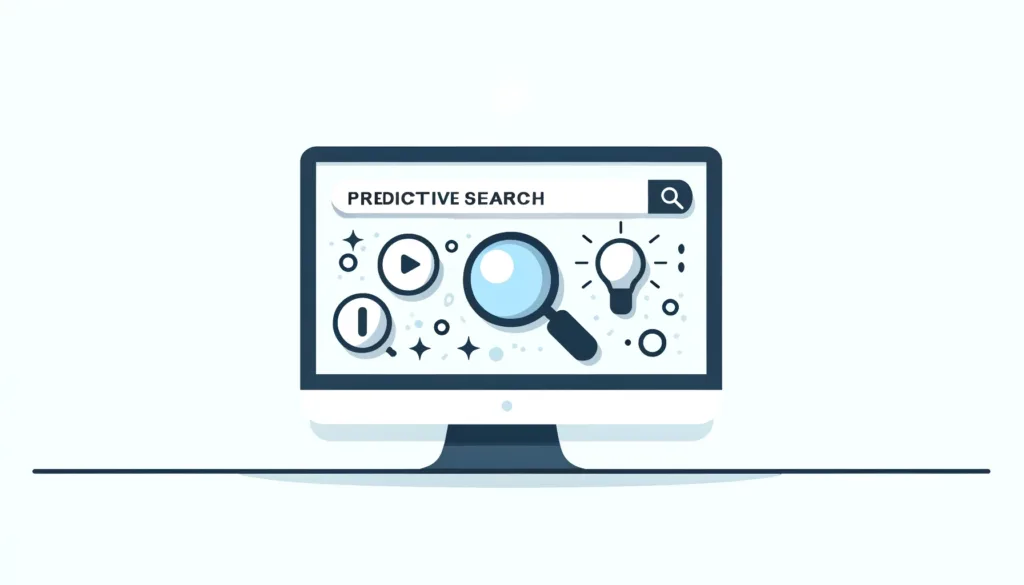
AI-powered search engines use artificial intelligence to understand your search queries and provide more relevant and accurate results. AI-powered search engines understand user queries better and provide better results in less time. This technology understands the peculiarities of human language, so instead of only matching terms, it interprets the intent behind queries, which results in a more intuitive user experience.
Additionally, AI can learn from interactions to improve its accuracy and efficiency, which makes search engines smarter. As AI technologies advance, more features are being integrated.
For example, predictive search, which makes suggestions based on a user’s search history and current online activity, and improves the search experience. For example, Amazon’s search engine uses AI to recommend products based on users’ previous purchases and browsing history, significantly boosting their sales.
A McKinsey study found that 35% of what consumers purchase on Amazon comes from product recommendations based on AI web search algorithms.
The future of AI web search looks promising, with ongoing advancements expected to introduce more sophisticated capabilities.
Predictive search, for example, is set to become more prevalent, with AI algorithms anticipating user needs even before a query is made. Gartner predicts that search engine volume will drop 25% by 2026 due to AI chatbots and other virtual agents enhancing the proactive delivery of personalized content and recommendations across digital platforms.
How AI Web Search Works
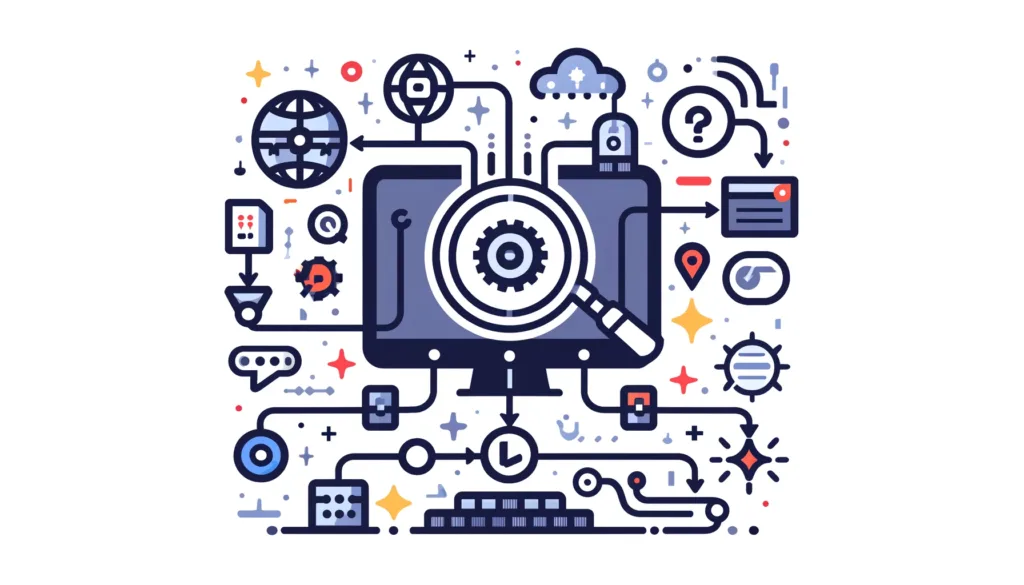
AI-powered search engines use various tools and technologies to provide accurate and quick results. This is how these systems operate:
- Understanding Natural Language: NLU algorithms are used by AI search engines to understand user queries in natural language. By understanding the search query context, these systems can provide more relevant results. One of the main purposes of NLU is to create chat- and voice-enabled bots that can interact with people without supervision.
- Machine Learning: Artificial intelligence search engines use machine learning techniques to learn from previous search queries and user interactions. This enables the system to produce more individualized results and continuously enhance its comprehension of user preferences. An essential component of this learning process is annotated data, which involves tagging or labeling raw data in a way that helps the AI understand the context and content of the information it is processing. Annotated data helps AI search engines better understand the meaning behind user queries and improve their algorithms based on the quality and relevancy of the results they provide.
- Advanced Algorithms: Sophisticated algorithms, like semantic search, analyze the meaning of words and phrases. As a result, the system may deliver more accurate and contextually relevant results.
- Knowledge Graph Technologies: Knowledge graphs are massive databases of related information used by AI search engines. They organize data from multiple sources, capture information about entities of interest in a given domain or task (like people, places, or events), and forge connections between them. By utilizing this structured data, search engines can deliver responses that are more in-depth and insightful than simple search results.
How to Find Answers Faster Using AI-Powered Search Engines?
Artificial intelligence search engines are getting smarter all the time. They leverage the newest developments in AI to deliver faster, more relevant search results to users.
Here are the top AI search engine tools, each with special skills to enhance the search experience.
Best Google Search Alternative
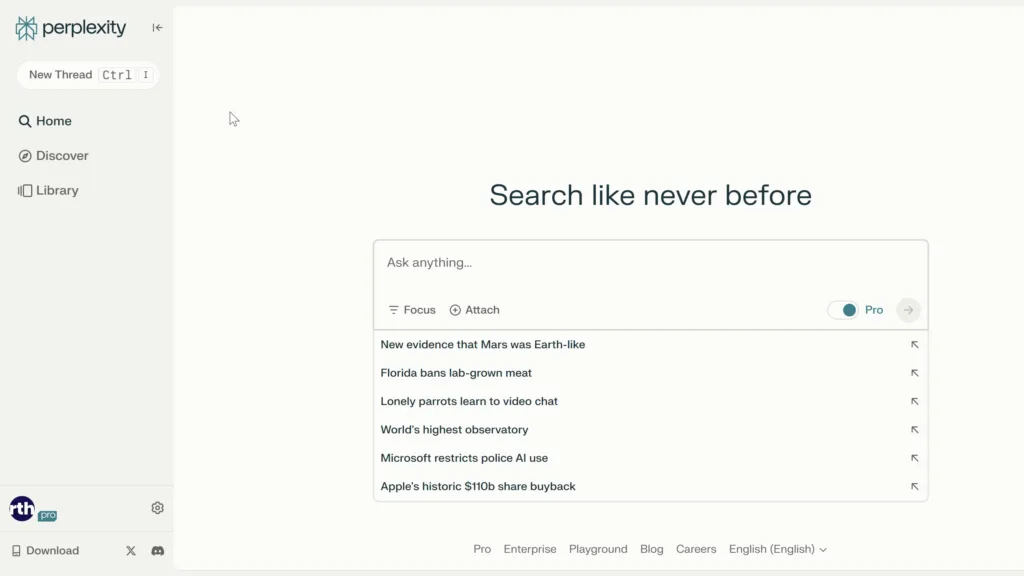
Perplexity.ai is like a knowledgeable friend living knowledgeable friend inside your computer or phone. It provides personalized answers to questions rather than just displaying a list of links.
Powered by the most advanced language models (GPT-4, Claude, Sonar, and Mistral), Perplexity.ai excels at understanding natural language queries. You can ask any types of queries. Actually, you can chat with it the same way you would with a living person, and it will deliver a precise, contextually relevant response.
It is particularly useful for complex search queries, thanks to its conversational interface that enables users to ask follow-up questions and dig deeper into topics.
It will also show you all the relevant links to the sources it used, so you can always double-check the information.
User Experience
Using Perplexity.ai has an intuitive user interface: you just type in your question in the search box, and the AI generates a clear, concise answer. If you need more detail, you can ask follow-up questions within the same conversation, making it feel like chatting with a smart assistant.
Key Features
- Copilot function
- Six advanced language models to choose from
- Image search and image generation
- Follow-up question capability
- Advanced natural language understanding
- User-friendly conversational interface
What I like about Perplexity.ai
- Provides precise and direct answers quickly
- Searches on Google, YouTube, and academic papers.
- Conversational interface simplifies the search experience
- Offers only contextually relevant content
What I don’t like about Perplexity.ai
- Free version is limited to 5 copilot uses
- Image generation function may not always produce high-quality images.
Perplexity Pricing
Perplexity AI offers both a free plan and a paid Pro plan. Here is the pricing according to its own answer:
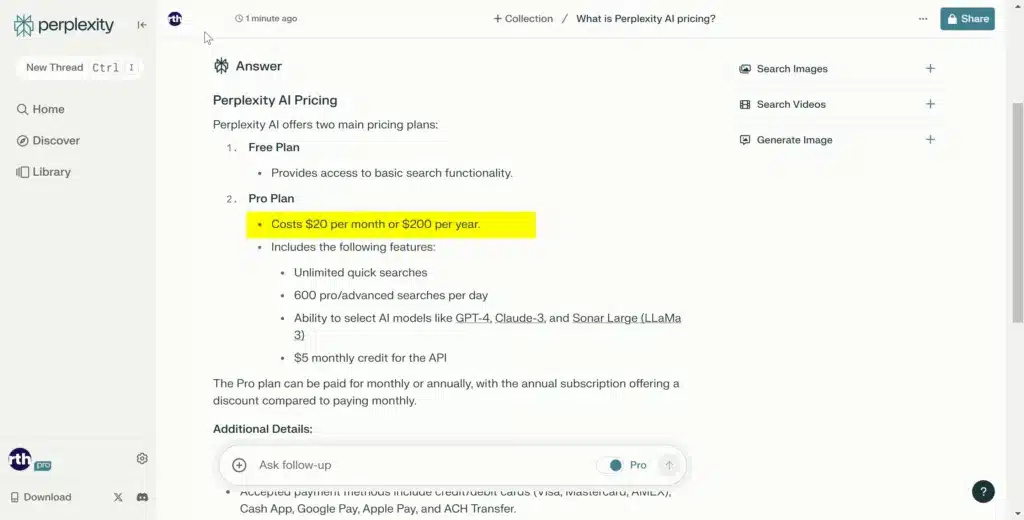
Best for Personalized and Private Search
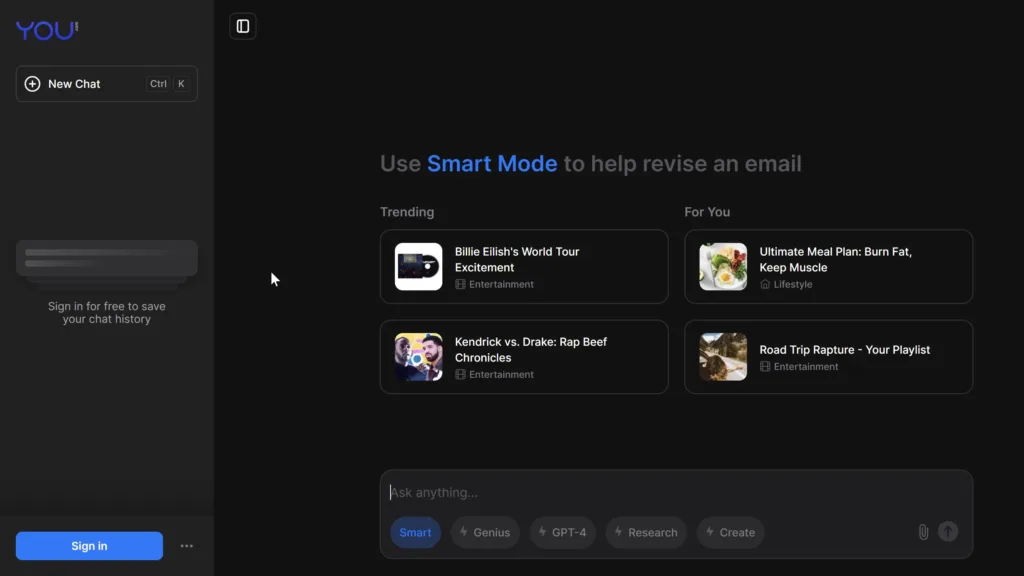
You.com is a search engine that prioritizes privacy and personalization. It uses AI to customize search results based on user preferences while ensuring that data privacy is maintained. You.com allows users to directly interact with results, like playing videos, opening PDFs, or previewing documents right from the search page, improving the entire search process.
User Experience
You.com simplifies the search experience by providing interactive search results, allowing users to access the content directly from the search page without additional clicks.
Key Features
- Customizable search results
- Interactive search results
- AI-driven personalization
- Visual search (Image-based search)
- Data privacy
What I like about You.com
- Enhanced privacy features
- Customizable and tailored search
- Interactive content preview
Here You.com search engine was asked to share tips and guidance on how to craft a distinctive and effective thank-you note following a job interview, and then share a few examples.
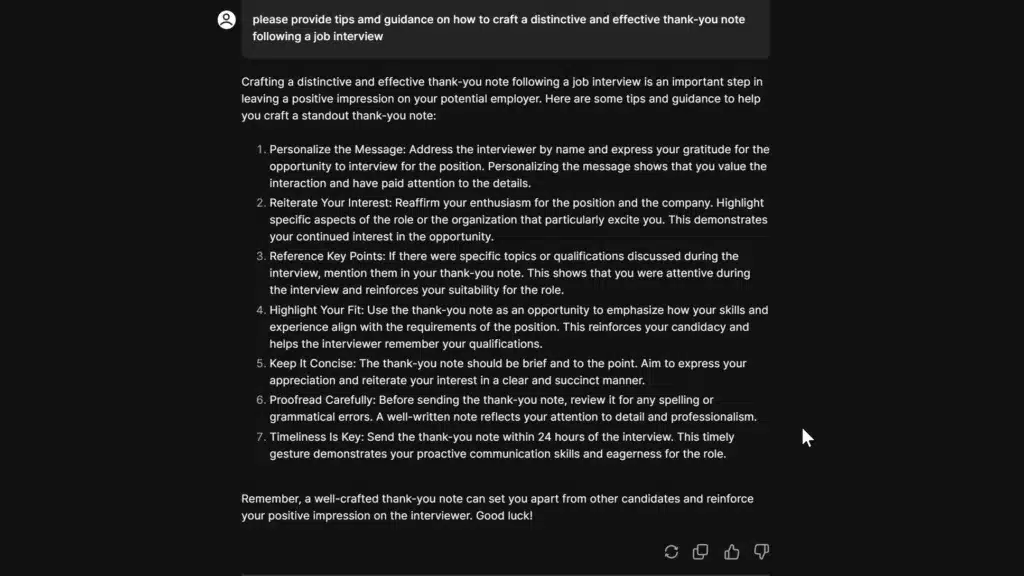
You.com Pricing
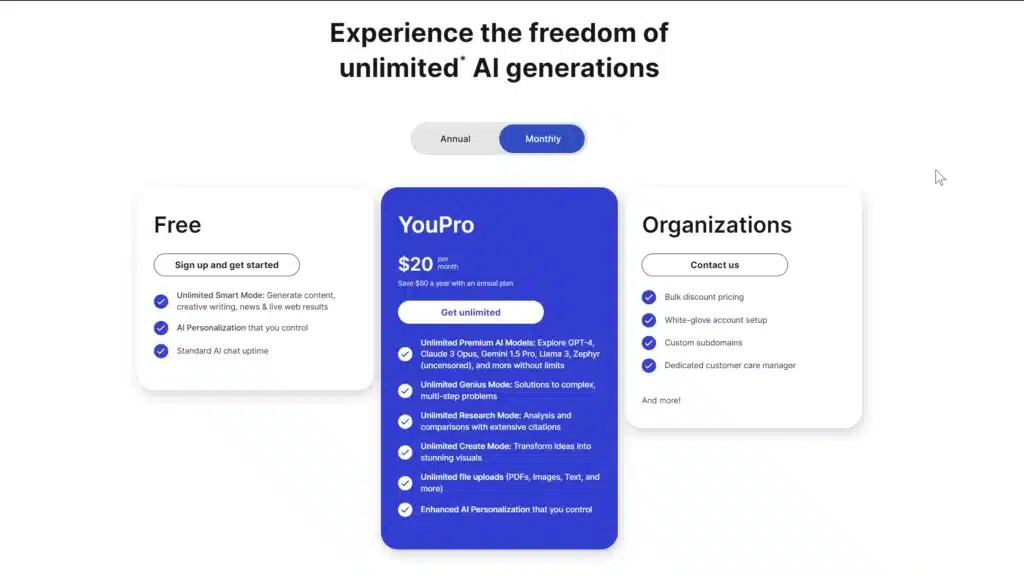
You.com offers three plans:
- Free Plan – It includes unlimited Smart Mode for generating content, AI personalization, and standard AI chat uptime.
- YouPro Plan – Priced at $20 per month, it offers unlimited access to premium AI models like GPT-4, Claude 3 Opus, and others, with features like Genius Mode, Research Mode, Create Mode, and enhanced AI personalization. It also includes unlimited file uploads.
- Organizations Plan – Custom pricing and features include bulk discount pricing, white-glove account setup, custom subdomains, and a dedicated customer care manager.
Best for Academic Research
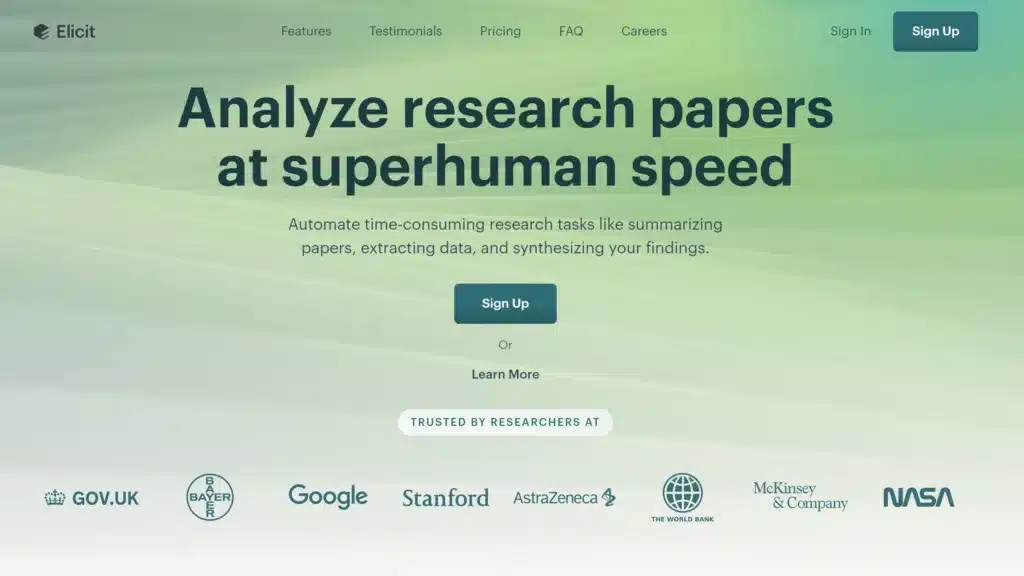
This tool helps users to find scientific papers, extract data, and create literature reviews. It is designed for academics and researchers. Elicit uses AI to understand complex research queries, crawl academic databases, and present results in an organized way to speed up the process and ensure the search relevance.
User Experience
Using Elicit.org is straightforward: enter your search query, and the AI offers academic databases to deliver relevant papers and data. The interface presents results in a way that makes reviewing and extracting insights easier.
Key Features
- AI-powered academic search
- Structured literature review results
- Easy data extraction from papers
- Focus on scientific databases
Here is how this tool provides answers.
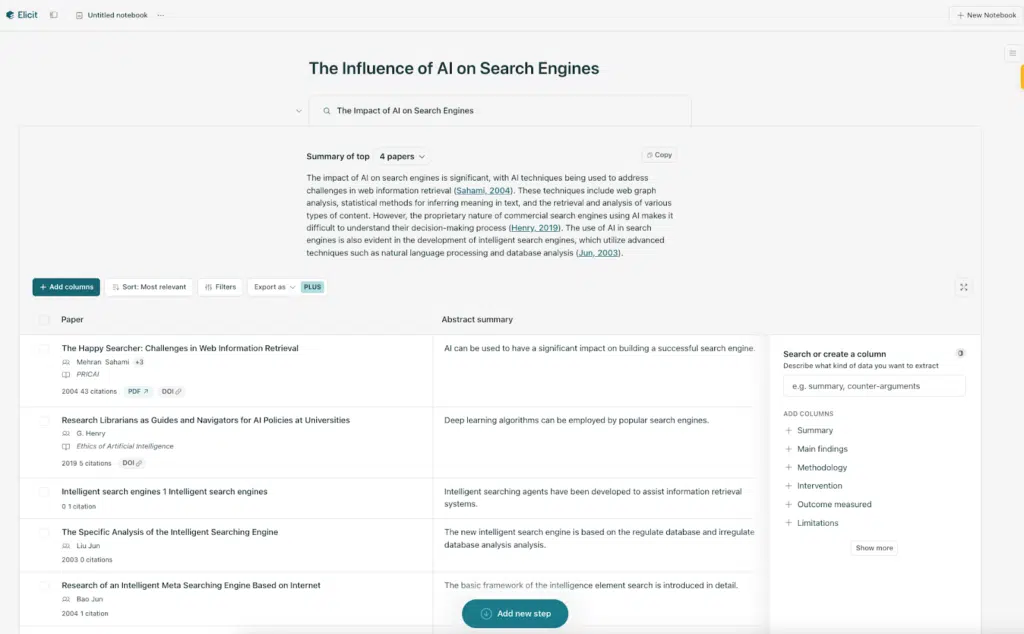
What I like about Elicit.org
- Saves time in academic research
- Accurate and organized results
- Focused on scientific content
What I don’t like about Elicit.org
- Limited to academic papers
- Needs improvement in handling broader search topics
Pricing
Elicit.org provides free access to its AI-powered research assistant.
04. Bing AI Search
Best for Broader, Contextual Queries
Artificial Intelligence has been included in Microsoft Bing to improve search performance. Bing AI provides more relevant search results and a summary of answers from many sources. It uses natural language processing to comprehend the purpose behind users’ searches better. It works incredibly well for broad queries where context is important.
Microsoft reported that after integrating AI into their Bing search engine, the speed of search results improved dramatically, enhancing user experience by providing quicker responses.
With the new feature included in the Search Engine Results Page (SERP), pre-generated question-answer pairs and similar previously asked questions are used to populate the PAA block, enabling users to navigate the SERP by asking more additional questions instead of just browsing new documents.
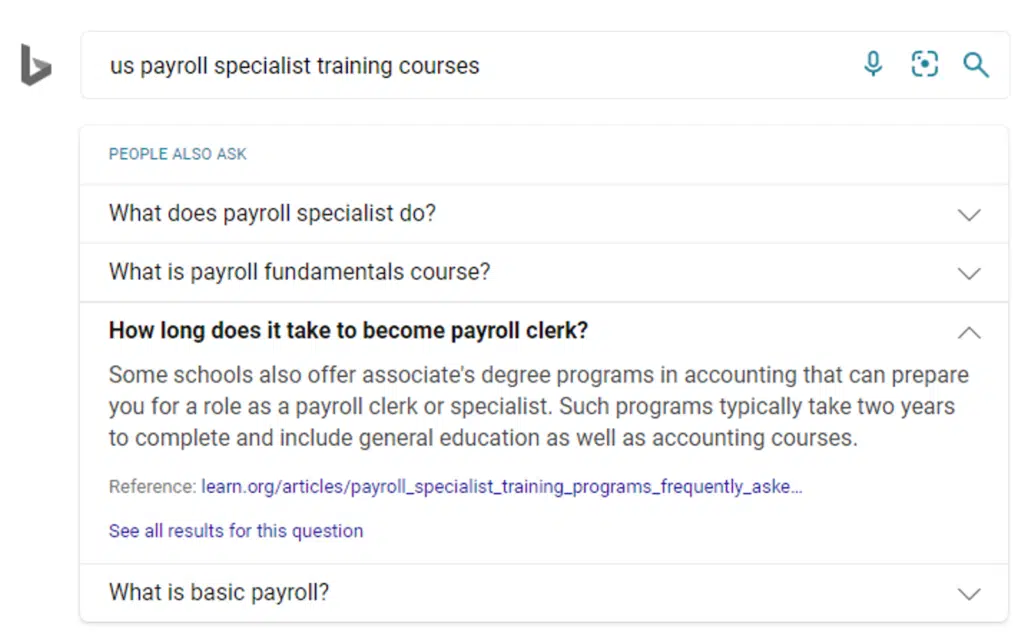
User Experience
Bing AI Search integrates seamlessly into the Bing search engine. Users enter their queries, and the AI provides quick, relevant answers with summaries that streamline the search experience.
Key Features
- Contextual understanding of search intent
- Summarizes information from multiple sources
- Quick and accurate results
What I like about Bing AI Search
- Improved search result accuracy
- Contextual summaries enhance understanding
- Faster response times
What I don’t like about Bing AI Search
- Still an evolving technology that can struggle with very complex questions
- Ads in the search results can sometimes clutter the experience
- Has some limitations like:
- Character limits on query lengths (4,000 on Edge, 2,000 on Chrome)
- Conversation limits before resetting (30 on Edge, 5 on Chrome)
- Core web search quality still lags behind Google in some areas
Pricing
Bing AI Search is freely available as part of the Bing search engine.
05. Sinequa
Best for Enterprise Users
It is a powerful AI-driven search platform known for its enterprise search capabilities which was designed for large organizations dealing with vast amounts of data.
Sinequa uses advanced natural language processing (NLP) and machine learning algorithms to provide highly relevant insights and information retrieval.
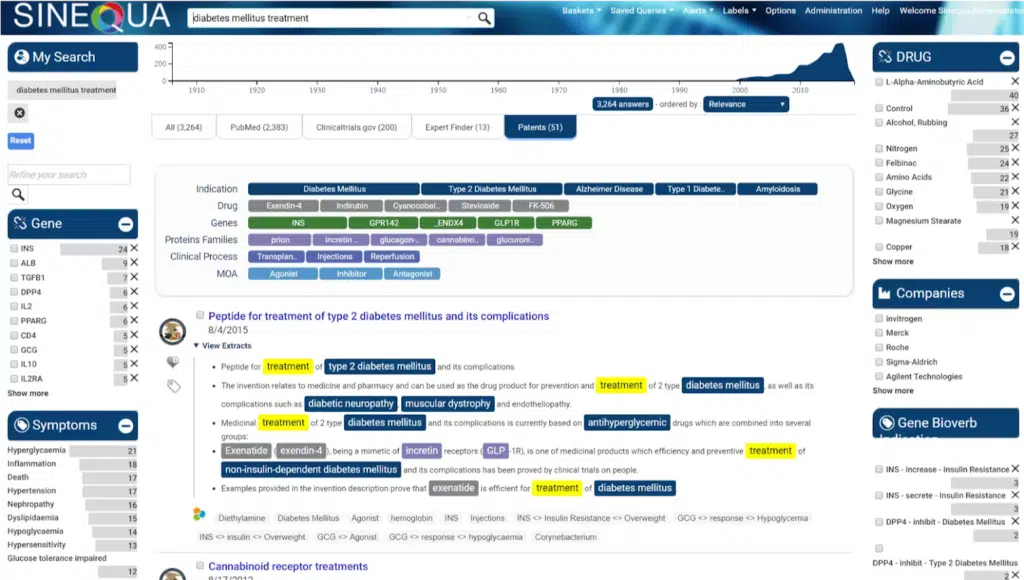
User Experience
Sinequa simplifies enterprise data management by offering intuitive search capabilities. Employees can easily find relevant information from vast data sets across departments and repositories, enhancing productivity.
Key Features
- Enterprise-level data search
- Advanced NLP and machine learning
- Secure data access controls
- Customizable search filters
What I like about Sinequa
- Excellent for large-scale data management
- Tailored to enterprise needs
- Secure and customizable
What I don’t like about Sinequa
- Requires technical setup and customization
- Primarily suited for large organizations
Pricing
Sinequa offers custom pricing based on enterprise needs and usage.
Conclusion
AI-powered search engines are not just a technological upgrade but a paradigm shift in how we access and interact with information. Web search is becoming more helpful, efficient, and intuitive with the help of AI, which is radically changing how we look for things on the internet.
AI-powered web search will become an essential tool in our digital life as AI technologies advance, promising to provide even faster, more accurate, and more personalized search experiences.
FAQ
Is there an AI search engine?
Powerful tools like Perplexity, You.com, Andi Search, and Metaphor AI Search leverage AI to understand queries and provide more relevant answers.
Is Google powered by AI?
While not fully AI-powered, Google integrates AI capabilities like Google Gemini and Search Generative Experience (SGE)to enhance search with insightful answers and query refinement.
What is the AI alternative to Google search?
Perplexity and You.com are the best possible alternative to Google. Unlike traditional keyword-based searches, these tools offer AI-powered search experiences, giving you comprehensive answers in seconds.
Can I use Google AI for free?
Google provides free AI tools like Google Lens, Google Translate, and Google Assistant for individual use, while advanced capabilities may require paid subscriptions.
Disclosure: This post may contain affiliate links, and if you decide to buy any of the promoted products, I may receive a commission at no additional cost to you. By doing this, I might feel more inspired to continue writing on this blog. You can read our affiliate disclosure in our privacy policy.
Editorial process: My reviews always result from real-world experience. Read my Editorial Guidelines to learn more.
The posts may contain affiliate links. However, this never impacts my commitment to honest, unbiased recommendations. If you decide to buy any of the promoted products, I may receive a commission at no additional cost. By doing this, you inspire me to create helpful and engaging content. You can read about affiliate disclosure in the privacy policy.
We improve our products and advertising by using Microsoft Clarity to see how you use our website. By using our site, you agree that we and Microsoft can collect and use this data. Our privacy statement has more details.


